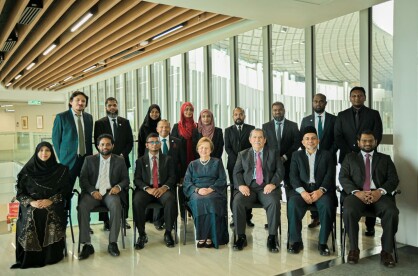As January 2025 nears its end, the impact of the Maldives Monetary Authority’s (MMA) new foreign exchange regulation is becoming evident. According to President Dr. Mohamed Muizzu, tourism service providers in the Maldives have deposited over USD 25 million into banks in compliance with the new rules. This substantial deposit suggests that the regulation is fulfilling its intended purpose of improving foreign exchange availability and stabilizing the country’s financial system.
The successful implementation of the regulation marks a significant shift in the country’s approach to managing its foreign exchange reserves. While initial concerns were raised by industry stakeholders, adjustments made to the policy ensured a smoother transition, resulting in widespread compliance among tourism operators.
MMA introduced this regulation in October 2024 to address the country’s persistent U.S. dollar shortage. Initially, under this rule, all foreign currency earnings from the tourism sector was to be deposited into banks, a move aimed at improving the circulation and availability of foreign exchange within the Maldivian economy.
As part of the initial implementation process, the MMA mandated all tourism operators to register with the Maldives Inland Revenue Authority (MIRA) and reapply for registration within 30 days. Newly registered operators under MIRA were also required to apply for MMA registration within the same timeframe. This measure ensured that, by the end of 2024, all tourism industry operators would be formally registered and compliant with the new regulations.
Additionally, service providers in the tourism sector were required to submit monthly reports detailing their foreign exchange earnings and transactions to the MMA by the 28th of each month. Initially, the MMA set a rule requiring all foreign currency earnings to be deposited into a bank account within 87 days after the end of each month. This step was intended to strengthen the tracking and management of foreign exchange inflows and enhance the overall financial stability of the Maldivian economy.
Despite the government’s intention to stabilize the U.S. dollar flow, the regulation faced considerable backlash from industry stakeholders, particularly from resort operators and tourism service providers. Many expressed concerns that mandatory deposit and conversion requirements could negatively impact the tourism sector, which is the Maldives’ largest contributor to GDP and foreign exchange earnings.
In response to industry concerns, the MMA engaged with tourism stakeholders to make necessary modifications to the rule. The revised regulation introduced a tiered system for foreign exchange conversions based on establishment categories:
- Category A: Required to convert USD 500 per tourist arrival per reporting month.
- Category B: Required to convert USD 25 per tourist arrival per reporting month.
In addition to introducing the tier system, the Government also provided an alternative option for both categories:
- Category A resorts can either deposit USD 500 per tourist or 20 percent of their gross monthly income
- Category B guesthouses can deposit either USD 25 per tourist or 20 percent of their monthly income
Additionally, the MMA clarified that exceptions could be granted on a case-by-case basis under specific circumstances, allowing more flexibility for businesses operating in the tourism sector. These amendments helped alleviate concerns within the industry and allowed for a smoother transition to the new system.
Following the adjustments, the Foreign Currency Bill was successfully passed, and by November 2024, nearly all resorts in the Maldives were registered under the new foreign currency regulation. This marked a turning point in the government’s strategy to improve the country's foreign exchange reserves and address the dollar shortage.
While the initial rollout of the regulation was met with scepticism, the collaboration between the government and tourism industry stakeholders has helped refine the policy to balance economic stability with the needs of businesses. The success of this policy will largely depend on its long-term impact on foreign exchange liquidity, business operations, and overall investor confidence in the Maldivian economy. If the trend of increased dollar deposits continues, the Maldives could see significant improvements in its foreign exchange reserves, reducing reliance on external borrowing and mitigating economic vulnerabilities.







